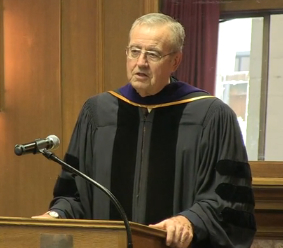Faith as taught in the Bible is not the same as we often think of it today.
Both the Old and New Testament assume God exists and He made an orderly creation. That creation order screams to the universe, to all humanity, the existence of God.
We see this, for example, in the call of Abraham.
Now the Lord said to Abram, “Go from your country and your kindred and your father’s house to the land that I will show you. And I will make of you a great nation, and I will bless you and make your name great, so that you will be a blessing. I will bless those who bless you, and him who dishonors you I will curse, and in you all the families of the earth shall be blessed.” So Abram went, as the Lord had told him, and Lot went with him. Abram was seventy-five years old when he departed from Haran. Genesis 12:1-4: 12
It’s also evident in God’s command to Isaac.
Now there was a famine in the land, besides the former famine that was in the days of Abraham. And Isaac went to Gerar to Abimelech king of the Philistines. And the Lord appeared to him and said, “Do not go down to Egypt; dwell in the land of which I shall tell you. Sojourn in this land, and I will be with you and will bless you, for to you and to your offspring I will give all these lands, and I will establish the oath that I swore to Abraham your father. I will multiply your offspring as the stars of heaven and will give to your offspring all these lands. And in your offspring all the nations of the earth shall be blessed. Genesis 26:1-4
The test of faith
A divine call came to both Jewish patriarchs. Both included a call to the land, to God’s presence and God’s blessing. And to both, it was clear that God would bless them for a purpose, God’s missionary purpose, that through these men and their offspring the Jewish people, all the nations of the earth would be blessed. Theirs was a calling to the world.
There was a difference between the two calls. For Abraham it was “go … to the land that I will show you.” For Isaac it was “Do not go down to Egypt.” However, for both men, it was a test of faith.
Jewish Hebrew scholar and commentator Dennis Prager has made this profound observation:
For both men, it was a test of faith. In Abraham’s case, the test was to go to an unknown land. In Isaac’s case, the test was whether he would trust God to provide food during a famine. When we moderns speak of faith or belief in God, we are almost always referring to belief in God’s existence. “Do you believe in God?” means “Do you believe God exists?” That is never a question in the Bible. Therefore, God was not testing Isaac (or Abraham before him) with regard to faith in His existence. That would have been absurd—who, after all, was speaking to them? The faith issue concerned God’s promises, not His existence. Throughout the Bible, God’s existence is a given. “Faith,” therefore, always refers to acting upon a belief that God will do as He promises. The more precise English word would be “trust.”
The Bible assumes the existence of God
Notice the biblical distinction Prager draws our attention to. The modern question is Do you believe in the existence of God? as opposed to the evolutionary mantra we are hammered with in school, that there is no God. That’s a modern question, but it’s not the question in scripture.
As Prager points out, the Bible considers any question about the existence of God an absurdity. The question in Genesis about believing God concerns his promises, his trustworthiness. It’s about man’s faith in God’s veracity, not in His existence.
We can take this further. Just as the Bible, the Word of God, assumes His existence, so God’s creation, His handiwork, also assumes His existence. As the Apostle Paul argues, we can look at creation itself and know that God exists, and we can know something about His nature and character.
For the wrath of God is revealed from heaven against all ungodliness and unrighteousness of men, who by their unrighteousness suppress the truth. For what can be known about God is plain to them, because God has shown it to them. For his invisible attributes, namely, his eternal power and divine nature, have been clearly perceived, ever since the creation of the world, in the things that have been made. So they are without excuse. For although they knew God, they did not honor him as God or give thanks to him, but they became futile in their thinking, and their foolish hearts were darkened. Claiming to be wise, they became fools, and exchanged the glory of the immortal God for images resembling mortal man and birds and animals and creeping things. Romans 1:18-23
Paul says the clarity in creation of God’s existence is sufficient to leave humans without excuse if they deny His existence. (See Creation Clarity Leaves No Excuses.)
Do you act on what you know to be true?
Again, the clarity of general revelation demonstrates God’s existence to everyone. The question becomes not Does God exist, but How will you respond to the reality of his existence? Do you celebrate what you know to be true? Do you act in faith on what is evident? Faith is not following your emotions, it’s acting on what is real, trusting what is true. The Greek word for faith is pistis: evidence, moral conviction. It comes from the primary verb pietho, to convince by argument, true or false; to assent to the evidence. In other words faith, as Prager says, is TRUST!
Someone has written of Dallas Willard’s discovery of the biblical concept of faith:
 Dallas has mentioned that when he first started ministry, he thought the way that you move people is by making them feel, not by bringing them knowledge. Often leaders in the church do that. We try to create an emotional experience for people and then use that to get them to form intentions. But then, of course, the intentions fade as soon as the power of the emotions fades, and that’s the nature of emotions. What is needed is for people to actually come to see—for us to come to see—reality differently, to believe at the level of the basic ideas out of which we live, because then we don’t have to hype people up into doing stuff; it flows naturally out of how things look to us. As Dallas teaches, this is a lot of work, because it is not about trying to whip people up into a certain emotional experience. We don’t want to be asking, “Was I moved by that talk?” or “How did that talk go?” but asking, “God, as we are together, would you open the windows so I can see?”
Dallas has mentioned that when he first started ministry, he thought the way that you move people is by making them feel, not by bringing them knowledge. Often leaders in the church do that. We try to create an emotional experience for people and then use that to get them to form intentions. But then, of course, the intentions fade as soon as the power of the emotions fades, and that’s the nature of emotions. What is needed is for people to actually come to see—for us to come to see—reality differently, to believe at the level of the basic ideas out of which we live, because then we don’t have to hype people up into doing stuff; it flows naturally out of how things look to us. As Dallas teaches, this is a lot of work, because it is not about trying to whip people up into a certain emotional experience. We don’t want to be asking, “Was I moved by that talk?” or “How did that talk go?” but asking, “God, as we are together, would you open the windows so I can see?”
What will you do with your knowledge of the truth?
The biblical concept of faith is to trust in truth, in what is real. (For more on this see Memo to Postmoderns: Truth Exists, and It Matters and The SEDUCTION of Relativism: Why the DNA Affirms Truth and Not Merely Belief.)
Does God exist? is an absurd question. The witness of general revelation (creation) and of special revelation (the Bible) is that God exists and you can know it.
The question is, what will you do with that knowledge? Will you trust him!
Celebrate what you know is true.
- Darrow Miller






